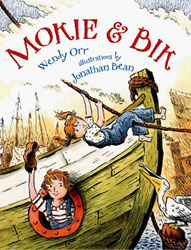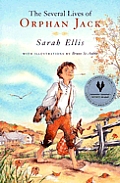Co-Review: Mokie & Bik by Wendy Orr
 September 25th, 2007 by Eisha and Jules
September 25th, 2007 by Eisha and Jules

by Wendy Orr
with illustrations by Jonathan Bean
Henry Holt & Co. Books for Young Readers
June 2007
(review copies)
Jules: “Mokie and Bik lived on a boat called Bullfrog. They lived in it, on it, all around it—monkeying up ladders and down ropes, over the wheelhouse and across the cabin floor.” This is our introduction to Mokie and Bik, the two young children of this most unusual chapter book, who climb and crawl and generally scamper their way around this houseboat, while their father is off working his day job as a “parrot” (who will come home with a “pirate on his shoulder”) on his “ship-at-sea with clouds of sails on five tall masts and brrr-ooping broop for fog, and he salty sailed around the world.” The children live with their mother, an artist, who I thought was so savagely cool and who is depicted in my favorite illustration of the book with “her easel and her Art” and “roaring brrr-oaring down the road” on a “botormike,” telling the children, “{a}sk me no questions and I’ll tell you no lies.” And their nanny, Ruby, lives with them; she can usually be found telling the children to “get out from underfoot!” The illustrations have been done by Jonathan Bean, an illustrator for whom I have already declared my great love this year (here and here and here and here and here. Whew).
Eisha, what did you think? The language in this title, I should add for those who haven’t read it yet, is quite distinctive. But I really fell in love with it:
Every morning, as the sun came up, when Mokie and Bik were still in their bunks in the bow, they heard Erik the Viking’s seagull boat chug-chug-chugging out to sea while the seagulls squawk wawk rawked and Erik shouted “No fisk yet for pesky gulls!”
I can’t figure out if children not-so-confident with their chapter-book-reading skills will be intimidated by this language or fall right in love with it, too. But I think those confident readers will be drawn to it, and as I read it, I thought that I haven’t read such an appealing chapter book in a long time — and I think mostly due to the language that has sprung here from Orr’s pen. What’s most impressive to me is that her wordplay could have easily been a bit too precious or unbearably cute, but she manages to stretch her words in such a way that bypassed cute and went straight to captivating and hilarious and please-read-me-out-loud.
Did all that playful wordplay work for you?
eisha: I share your hesitation about recommending this for an unsteady reader – I’m still trying to get my mind around “fisk” for “fish.” But yes, the playful, sing-song quality of the text is a lot of fun to read, and would probably be even more fun to read out loud. Better practice a bit, though… “botormike” doesn’t exactly spring unbidden to the lips.
And Mokie and Bik, the characters, were a lot of fun – kind of like a miniature matched set of Pippi Longstockings (except for Bik being a boy, of course, and they don’t have superhuman strength – okay, maybe not like her at all). My grownup-brain worried about them traipsing all over the place like that with no supervision worth mentioning (and that part of my brain was verified when Mokie had her accident on the dock). But my child-brain reveled in their seemingly perfect life of freedom and exploration, and always having a companion to share their adventures.
You’ve mentioned how much you loooooove Jonathan Bean as an illustrator. What did you think of his work here?
Jules: I think his pen-and-ink drawings did a fabulous job of capturing all the exuberance in Orr’s text. And if that cover (the only illustration in color) doesn’t make a child want to pick up the book, I don’t know what will, what with their monkeyin’ around and hanging out of Bullfrog. You’re right, Eisha, about the draw that their lives of exploration and freedom will have to young readers, particularly the typically overprotected child of contempoary suburban America — you know, tiny, well-manicured backyards; parents always hovering; over-scheduled children; etc. Arguably, children today need more characters like this through which to live vicariously (but now I sound like Grumpy Old Man yet again).
I guess I’m done, Eisha. This is a rather mini co-review of sorts, no? (Of course, we did start this probably over a month ago, and it stalled so long in my court). One more quick question (unless you have more to add): Didn’t you just love the ending?
One fuzzy foggy morning a ship passed so close to the wharf that Bullfrog rollicked and rolled, and Mokie and Bik tumbled—thump clunk overbunk—to the floor.
The ship brooo-ooped. Laddie barked, Ruby grumbled, their mother muttered, and Slow pulled his head under his shell.
“I remember that broop,” said Bik.
“No other ship comes that close,” said Mokie . . .
Their father has returned with “a waggles,” their dog. Such warmth there in the end, as the family is reunited.
Oh, wait! And then we get that lovely, detailed spread from Jonathan of the ship after it arrives right after Orr’s lively description of it:
There were oil smells and tar smells, and parrots—
whistling whistles and running fast,
heaving ropes and groaning grunting,
climbing masts and furling sails,
yabbering and yammering.
(Those last four lines should be indented, but WordPress won’t let me).
Can I just go sit on a corner downtown and read this aloud to anyone interested? I really hope that Orr makes a series of these characters — and sticks with Jonathan Bean, too.
Anything else you wanna add, Eisha?
 eisha: Nope, not really. Like you, I loved the ending. I loved the descriptive, imaginative language. And I think this fits a niche that not too many other books do – it’s great for young, confident readers. As a librarian I get a lot of parents who come in looking for something really good, and really entertaining, for their young-but-above-grade-level readers to read, but don’t want something with too sophisticated an interest level. This is a great choice for them. I’d put it in a class with The Several Lives of Orphan Jack by Sarah Ellis to fill that kind of need.
eisha: Nope, not really. Like you, I loved the ending. I loved the descriptive, imaginative language. And I think this fits a niche that not too many other books do – it’s great for young, confident readers. As a librarian I get a lot of parents who come in looking for something really good, and really entertaining, for their young-but-above-grade-level readers to read, but don’t want something with too sophisticated an interest level. This is a great choice for them. I’d put it in a class with The Several Lives of Orphan Jack by Sarah Ellis to fill that kind of need.
This was my first encounter with Wendy Orr, and I’m definitely going to be on the lookout for another one. Thanks for telling me to push it to the top of my TBR pile, Jules. ‘Till next time…
{See also Betsy Bird’s detailed review here} . . .

thump clunk overbunk! I love that.
You can go sit in a corner and read it to me aloud if you want! Absolutely…
II don’t think authors are really supposed to comment on reviews, but if they were, they might say something like, ‘Thank you! This was a risky book to write because I knew it was different, I knew the language might scare people off. It took me four years to work out how I wanted the language (yes, I did a few other things in the meantime!) I didn’t want a traditional lyrical singsong rhythm, which is something I find easy to get carried away with; I wanted it to sound like an authentic twin language and yet be something that the reader could figure out.
(Fisk, by the way, comes from Erik the Viking, being Norwegian for fish. This is NOT an excuse, because authors can’t stand behind each reader explaining their reasons, it either works or doesn’t. But I thought you’d be interested. I thought the kids’ language would have come from the languages they heard around the dock, and chose this because sounds very like the English. It’s also the only word my father can remember of the twin language they actually used, but I tried very hard not to be sentimental about adhering to truth.)
And you may also have heard that the Book Fairy has granted your wish about a series?
best
Wendy
PS Ditto to everything you said about Jonathan’s art. I’ve been excited by it from the time the very first roughs came through – simply wonderful.
I’ll say it again: WOO HOO for more Mokie & Bik books! Great news!